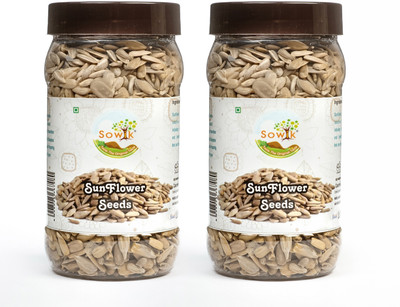SOWIK Raw Sunflower Seeds | Diet Food | Fiber Rich Superfood | Premium Quality Sunflower Seeds(2 x 200 g)
Quick Overview
Product Price Comparison
Sunflower seeds are the edible seeds of the sunflower plant (Helianthus annuus), which is native to North America. These seeds are typically harvested from the flower heads and come in two main varieties: hulled (with the shell removed) and unhulled (with the shell intact).Sunflower seeds are highly nutritious, offering a good source of:ŌĆóHealthy fats: Rich in unsaturated fats, particularly polyunsaturated fats like omega-6 fatty acids.ŌĆóProtein: A high-quality plant-based protein.ŌĆóVitamins and minerals: They contain significant amounts of vitamin E, B vitamins (especially folate), magnesium, and selenium.ŌĆóAntioxidants: Sunflower seeds are a great source of antioxidants, including vitamin E and phenolic compounds, which help reduce inflammation and oxidative stress.ŌĆóFiber: They are high in dietary fiber, especially in the unhulled variety.Sunflower seeds are commonly enjoyed as a snack, added to salads, baked goods, or used in granola mixes. They can also be pressed to extract sunflower oil, which is used for cooking, frying, and in various food products. The seeds are also used in the production of sunflower seed butter as a nut butter alternative.In addition to their nutritional value, sunflower seeds have various potential health benefits, including supporting heart health, improving digestion, and offering anti-inflammatory properties.Characteristics of sunflower seedsSunflower seeds have several notable characteristics that make them popular both as a snack and an ingredient in various foods:1.Appearance:ŌĆóShape: Sunflower seeds are small, oval, and flat.ŌĆóColor: They typically have a light beige or grayish exterior. When hulled, the inner seed is usually white or light yellow.ŌĆóSize: They are about 1-2 cm in length, with the size varying slightly based on the variety.2.Texture:ŌĆóHulled seeds: These are smooth and tender, with a slightly crunchy texture, making them easy to chew.ŌĆóUnhulled seeds: These are tougher due to the outer shell, which requires more effort to crack open. The shell itself has a rough texture, and the seed inside is softer.3.Taste:ŌĆóSunflower seeds have a mild, nutty flavor that is slightly sweet, particularly when roasted. The taste can vary depending on whether the seeds are raw, roasted, salted, or flavored.ŌĆóThe unshelled variety has a more earthy taste because of the outer shell.4.Nutritional Profile:ŌĆóHealthy Fats: Sunflower seeds are high in unsaturated fats, particularly polyunsaturated fats like omega-6 fatty acids.ŌĆóProtein: A good plant-based source of protein, providing all essential amino acids.ŌĆóVitamins & Minerals: High in vitamin E (an antioxidant), magnesium, selenium, and B-vitamins (such as folate).ŌĆóFiber: Unhulled seeds contain a good amount of fiber, which aids in digestion.5.Versatility:ŌĆóSunflower seeds can be consumed raw, roasted, salted, or flavored.ŌĆóThey can be used in cooking (in bread, granola, or salads), as a topping for yogurt or oatmeal, or eaten as a snack.ŌĆóThe seeds are also pressed to produce sunflower oil, used in cooking and cosmetics.6.Storage:ŌĆóSunflower seeds are shelf-stable but should be stored in a cool, dry place. To maintain freshness, it is ideal to store them in an airtight container, especially once the seeds are hulled.ŌĆóRoasted or salted seeds have a shorter shelf life than raw, unsalted seeds.7.Health Benefits:ŌĆóThey are linked to heart health due to their high vitamin E and healthy fat content.ŌĆóSunflower seeds support immune function, reduce inflammation, and provide energy due to their calorie-dense nature.


